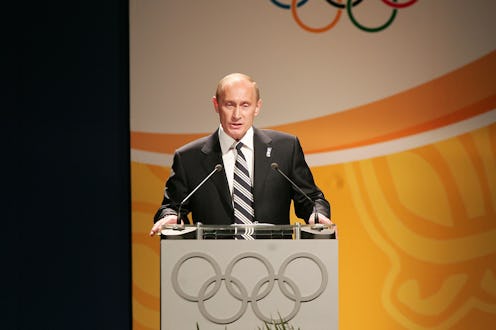News
IOC Won't Challenge Anti-Gay Laws
The International Olympic Committee won't question Russia's anti-gay laws prior to the Winter Olympics. On Thursday, the IOC decided to dismiss claims that Russia's recent legislation barring "gay propaganda" violates the Olympic charter's anti-discrimination rule, saying that they were “fully satisfied" that Russia and the related legislation were in compliance with the rules governing the Games.
Human rights groups (and many humans) were up in arms after Russia passed legislation banning "propaganda of nontraditional sexual relations among minors" in the country. Some argued that the laws will unfairly impact both athletes and visitors at the Winter Games in Sochi. Human Rights Watch said that the law was a "blatant violation" of the IOC's anti-discrimination clause. Russian officials have contended that the law is in place only to protect children and does not in any way impact gay residents, or visitors, to the country. (By the way, a recent Bustle interview with a gay American who studied in Russia provides a pretty solid rebuttal to that flimsy argument.)
Still, Jean-Claude Killy, chairman of the IOC Coordination Commission argued "The IOC doesn't have the right to discuss the laws that are in place in the country hosting the games, so unless the charter is violated we are fully satisfied."
According to Dmitry Kozak, a deputy prime minister responsible for preparations for the Winter Games in Sochi, the law is not discriminatory because everyone will get in trouble for spreading "non traditional" views on sex, not just gay people. "If people of traditional sexual orientation spread propaganda of non-traditional sex to children, then they will also be held accountable," said Dmitry Kozak, a deputy prime minister in charge of overseeing preparations for the Sochi Olympics. "So there is simply no need to talk about discrimination."
While the IOC has said that it won't challenge Russia's laws in the name of the Olympic charter, it did remind athletes that the Games are not the place for protests, even if they disagree with a host country's policies. Mark Adams, a spokesman for the IOC said, “No kind of demonstration or political, religious or racial propaganda is permitted in any Olympic sites, venues or other areas.”
“We don’t want the Games to be a platform for demonstrations,” he said.
That may prove tricky enforcing. Recently, a shared kiss between Russian sprinters Kseniya Ryzhova and Tatyana Firova was touted as a protest of the country's laws which include outlawing public displays of affection between same-sex couples. For their part, Ryzhova and Firova claimed that it was a "celebratory" kiss, shared after the two won a race during the World Athletics Championships. "If we, accidentally, while congratulating each other, touched lips, excuse me. We think the whole fuss is more of a sick fantasy, not grounded in anything," Ryzhova said.
If it had been a "real" kiss, of course, the two athletes could have faced jail time.
The Winter Olympics in Sochi are slated to start on Feb. 7.
